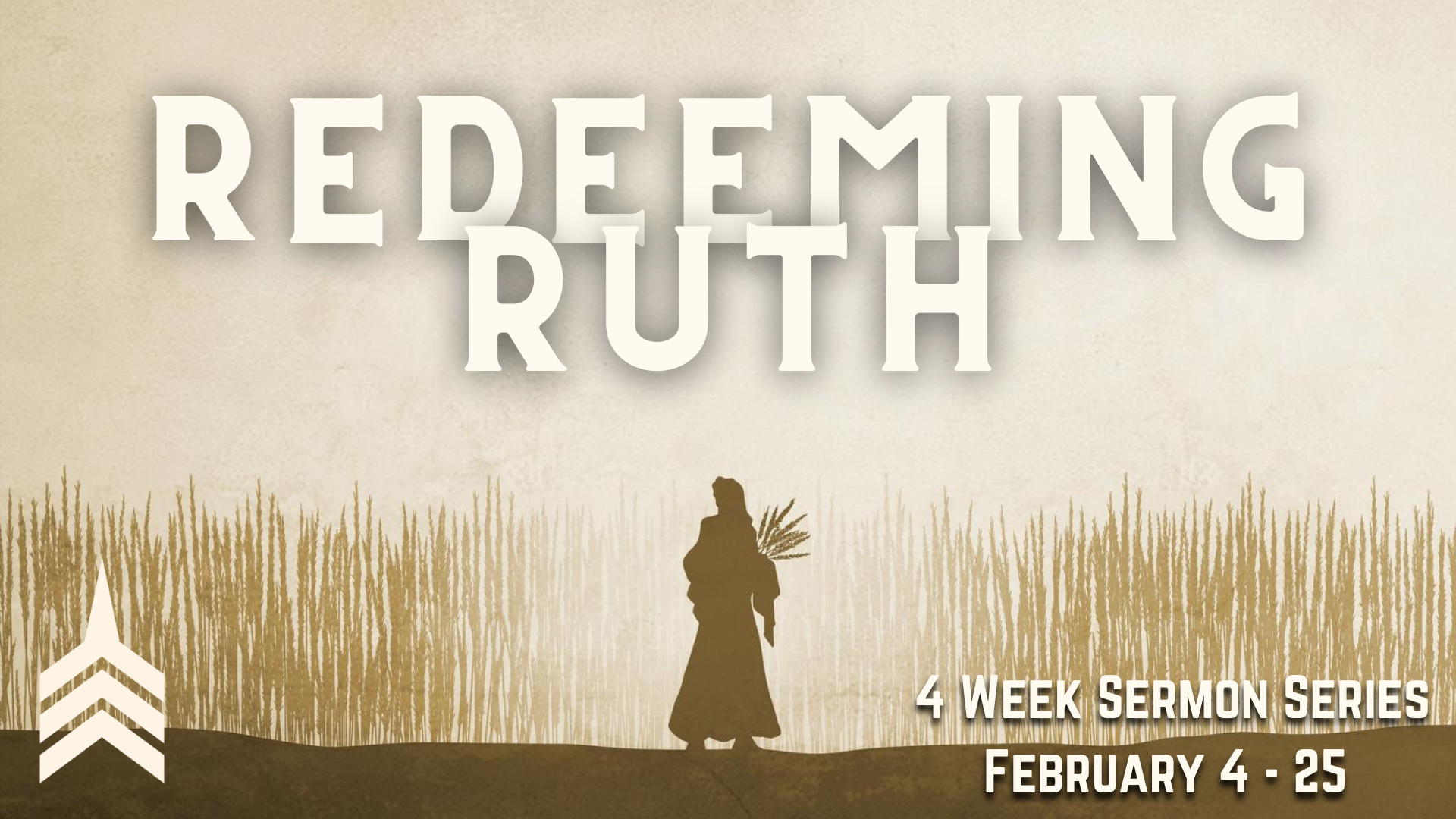Get Prepared for Ruth
Feeling unprepared is the worst. We all have experienced this feeling in many ways and in many different circumstances. Maybe you have experienced this sensation on a daily basis lately! You walk into an important meeting, presentation, or conversation with a stomach that is sinking, a heart that is pounding, and a forehead that is sweating because you know that you are not ready for what is coming. You didn’t adequately work ahead. You didn’t put enough thought into what you will say or how you will respond to what others might say. In these moments of frustration, our present selves get angry at our past selves for their lack of forethought and planning. You have no idea how many times I’ve thought to myself, “Ugh, I hate past Taylor! He is such a procrastinating jerk! Why did he do this to me!” Obviously, past Taylor and present Taylor are the same exact person but I think you get my point. We long to be more prepared but for some reason, we often don’t take the necessary steps to actually be more prepared.
I think that many Christians have this feeling in regard to church. They go to bed late on Saturday night, roll out of bed late on Sunday morning, hurry to get the kids fed and looking somewhat presentable, lose their temper on the way to church, and walk into service several minutes late. They feel rushed, annoyed, and exhausted. Then they walk out of the service thinking, “Well, I didn’t get anything out of that,” and go about the rest of their day. Maybe you didn’t get anything out of the service because you didn’t put much into it. Maybe you didn’t reap a harvest of blessing because you didn’t sow seeds of preparation throughout the week. You didn’t truly prepare your heart and mind to pray to the Lord, to sing His praises, to receive His Word, and to engage with brothers and sisters in Christ. You came unprepared so you leave unfed and ill-equipped.
You may be reading this and thinking, “That’s me! How can I address this problem? How can I come prepared on Sunday morning?” That is a great question and I am so glad that you asked it! Let me answer that question by pointing you forward to what is coming up very soon. This Sunday, we are beginning a four-week series through the book of Ruth. This is an often-overlooked book because it just seems like a straightforward love story. But it is so much more than that! Ruth may seem a bit slight and unimportant compared to theological mountain peaks such as Genesis, the Gospel of John, Paul’s letter to the Romans, or Revelation. But it is actually a small book that is packed with BIG truths. Big truths about this life, ourselves, and God Himself. One pastor describes the book of Ruth as “much in little – a little book containing far more about God than its size would suggest.”[1] I hope and pray that every single one of you reading this blog post will come to church throughout February with hearts and minds that are ready to receive and apply these big truths from Ruth. Let me give you three quick ways to get the most out of this sermon series:
Pray:
Pray for the Preacher – This may sound a bit self-serving but I ask that you pray for me! I don’t feel bad asking for this because the apostle Paul often did as well (Romans 15:30-32; Ephesians 6:19-20; Colossians 4:2-4). If Paul, the greatest Christian to ever walk the face of this planet, needed prayer, then I most certainly do! I want to diligently prepare. I want to accurately represent the text. I want to preach with clarity, passion, and urgency.
Pray for Yourself – Go to the Lord throughout this week (as well as every week in February) and ask that you would have open ears, a receptive mind, and a willing heart as you sit under the preaching of the Word.
Pray for Others – Ask that the Lord would bless your fellow brothers and sisters in Christ with the gift of His Word. Pray that the Holy Spirit would encourage, comfort, guide, challenge, convict, and equip His people. Pray that the Spirit would use every aspect of the services (singing, praying, preaching, fellowship) to draw the lost in the room to a saving knowledge of Christ.
Read/Meditate:
Read Ruth in Its Entirety - As I wrote earlier, Ruth is a very short book which means that you can easily read it in one sitting. I know we all vary in our reading speeds but even the slowest of readers can knock Ruth out in about twenty or so minutes. That is the length of a sitcom episode! Instead of watching yet another episode of Seinfeld or The Office, read Ruth instead! I would encourage you to read Ruth at least once before Sunday. If you are able, try to read it two or three times so that you can familiarize yourself with the flow of the narrative and soak your mind in the richness of its themes. You could even read the entire book aloud with your spouse and/or your kids during your devotional time as a family.
Take Notes – Your Bible shouldn’t be pristine and unmarked. Highlight key passages that stand out to you, write notes in the margins, put question marks next to verses that confuse you and require further study. Ask yourself questions and see if I answer them during one of the sermons!
Pay Attention to the Big Picture and the Small Details - When you read any book of the Bible, it’s important to pay attention to the context and background. Here are some important details to keep in mind as you read Ruth:
1. Author - Scholars are not exactly sure who wrote the book of Ruth. Some believe it was Samuel but there is no internal or external evidence of his authorship.
2. Setting - The author provides the background of Ruth in the very first verse: “In the days when the judges ruled,” (1:1). So, we know this historical account took place around 3,000 years ago during the time of judges such as Ehud, Jephthah, and Sampson. At this point in Israel’s history, there is no king and wickedness reigns supreme. This background is vitally important for understanding the message and ultimately the ending of Ruth.
3. Characters -
A. God - As with all of Scripture, the central figure of Ruth is God Himself. We mainly catch glimpses of God in conversation and through the actions of the other major characters.
B. Naomi - An Israelite woman who has lost her husband and two sons while living in Moab as Israel endures a harsh famine. She returns to Israel once the famine comes to an end with her daughter-in-law Ruth.
C. Ruth - A widowed Moabite who is miraculously converted to saving faith in Yahweh. She demonstrates this saving faith by turning away from the false gods of Moab and sticking by Naomi in the town of Bethlehem. She is a woman of loyalty and perseverance.
D. Boaz - A wealthy field owner in Bethlehem who displays integrity throughout the entire narrative. He is a relative of Naomi’s deceased husband.
Focus on the Major Themes – As you read and study, make sure to be on the lookout for these major themes:
The Providence of God – This is the overwhelming emphasis of the book of Ruth. All throughout the four chapters, we come face to face with a God who is in complete control of everything. He is at work behind the scenes directing human history and our own lives in a very specific direction. A direction that leads to His glory and our ultimate good.
The Kindness of God – We do not serve a passionless and indifferent deity who couldn’t care less about us. We serve a loving God who constantly showers us with gifts of kindness every single second of every single day. In Ruth, the loving-kindness of God is seen most clearly in the loving-kindness of His people. Make sure to note where you see the kindness of God displayed through the kindness of others (spoiler alert: you will be taking a lot of notes on this).
The Redemption of God – As does every other book of the Bible, Ruth reveals our sinfulness and points us to our need for redemption. Ruth needed to be redeemed from her unfortunate position as a widowed Moabite living in Israel. We need to be redeemed (bought back) from our horrible position as slaves to Satan, sin, and death so that we can be brought into God’s kingdom and family (Colossians 1:12-14).
The Fulfilled Promises of God – Yahweh is a covenant making and promise keeping God. When He says that He is going to do something, it is as good as done. You can count on Him and His Word. We see this truth on display in Ruth as God providentially secures the family line that His Son, Jesus Christ, would eventually come out of at the perfectly planned time in history.
Discuss:
Have Meaningful Conversation with Family and Friends – As you read and study, do not keep these truths to yourselves! Share what you learn with your loved ones. Call a friend to share your notes and thoughts. On your drive to church each Sunday, recount the story of Ruth in your own words to your spouse or have your kids try to provide a recap themselves! Find creative ways to work the Word of God deep into your bones so that it becomes a part of who you are and shapes how you think, speak, and act.
Come Ready to Engage at Small Group – Your small group discussion will only be as good as your preparation and participation. Ready yourself to engage in meaningful conversation at small group by re-reading the chapter that was studied the Sunday before or by even listening to the sermon again online. I guarantee that your small group discussion will blossom if the members choose to properly prepare themselves to meditate upon how the Word applies to their everyday lives.
During this past month of study, I have grown in my love for the book of Ruth and it has become one of my favorites in the entire Old Testament. It is a beautiful snapshot of our wonderful God. I cannot wait to dig into the Word together over the next four Sundays. Please pray that I will be prepared and I will pray that you will be prepared!
[1]Sinclair Ferguson, Faithful God: An Exposition of the Book of Ruth, pg. 14.




